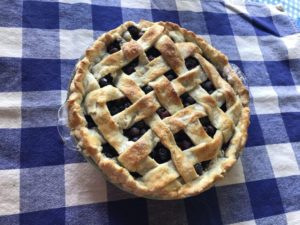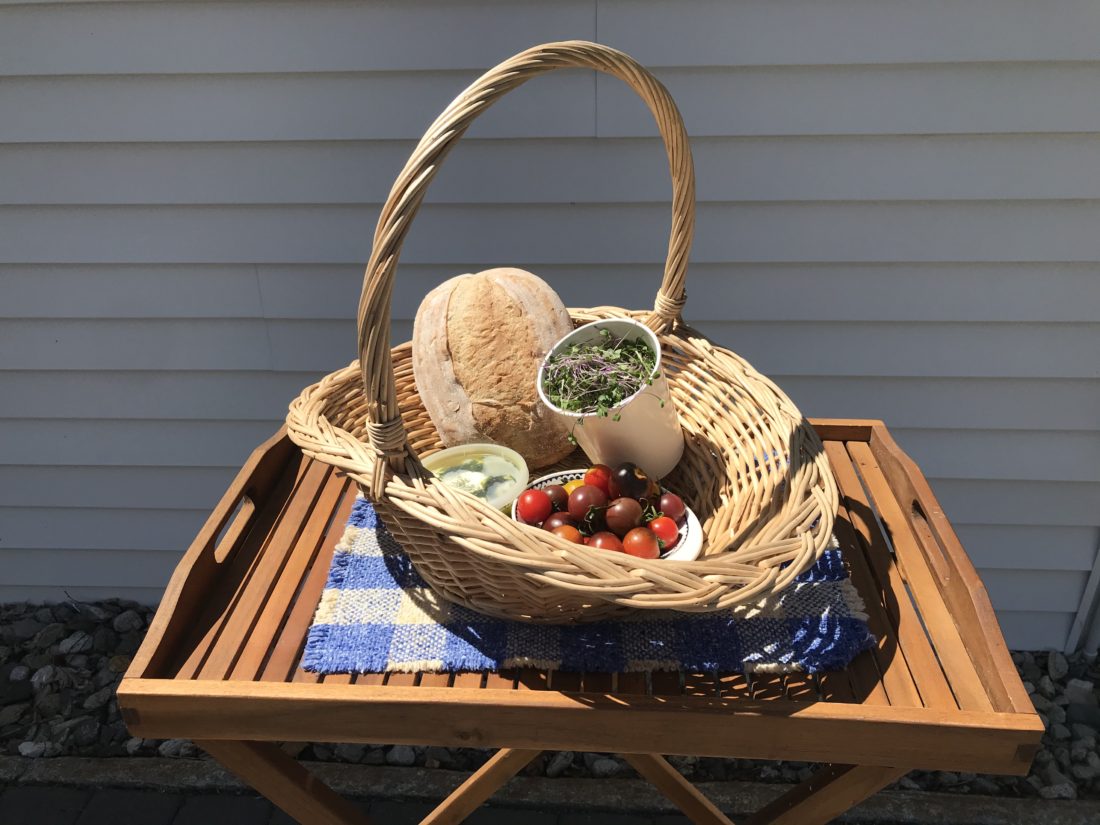Why We Flock to the Farmer’s Market
Electric blue lights up the pond these days — damselfly nymphs in their neon gowns cling to the long green blades of the reeds as their magnificent parents whir and troll overhead, swinging out with convincing displays of aggression towards the human who has wandered down to watch the show for a spell. There are about twelve nymphs that I count, and they appear to be sipping what moisture they find along the tender green reeds. Certainly, they are not seeking camouflage — the Creator was thinking dazzle, not a danger-free life, when these flashes of magic were made.
Saturday is Farmer’s Market day in nearby Tamworth, a gathering of more than a dozen local farmers, bakers, fermenters, distillers and cheese makers who arrive at dawn to offer their wares at the Unitarian Church in the town center. I pull myself away from the nymphs, grab my sack, and drive the 20 minutes in happy anticipation. The Farmer’s Market never disappoints.
This year it is different. Distancing measures have moved the operation to the parking lot of an elementary school. Booths are separated by requisite paces. Gone, the cheery clubbiness of yore, the shoulder to shoulder peering into crates of mushrooms, or tasting samples of cider and mead. There’s no music, no mingling; there are masks, gloves, and posted sanitation reminders.
Still, we come in droves — because we need to, like the damselflies to the pond. You have to get here early to buy the Sunshine Bakery’s French loaves, the microgreens and artisanal goat cheese. There is iced tea with lemon and mint to slake our thirst, and a booth frying flounder for tacos. Fresh lamb sausages and local goat cheese. Tented tables offering face creams and barrettes, homemade cards and essential oils.

By 11, most of the inventory is gone and the market still has two hours to go.
I shuffle from booth to booth in no hurry, pay for tomatoes and cheese and bread. But especially this year the purpose of coming to the Farmer’s Market is much less about acquisition, even of necessary food.
In spite of the masks, you can still sense the smiles behind the masks, occasionally the weariness of having gotten up so early on a Saturday morning, the wear and tear of the past five months. Many of these families split their time among several kinds of work. Some are teachers; some manage wholesale food businesses alongside this more intimate and communal event. Many share their lives with partners who leave the house each day for front line jobs: driving busses, as service workers, nurses. The pandemic has negatively affected their security, to say nothing of their delicate, interdependent economic systems.
Despite these new pressures — or in part because of them — they faithfully show up and we do, too. We have learned in a new way, the value of the singular, the personal.
A mere five months ago, we pushed our grocery carts at warp speed past the mounds of imported avocados and grapes, the groaning shelves of breads, grabbing but not tarrying over the provenance of the cheese we spread on our bread, or the early morning labor, often while it was still dark, that kneaded and baked that bread. We gave little thought to the long chain of junctions that very distantly connected us to a human grower. The miracle of the singular rarely occurred to us in this context, nor the fragile ecosystems that keep us alive and afloat.
We are wiser now. A bunch of parsley seems a work of art. The person who raised and tended and harvested it, closer to a second cousin than a funky, appealing stranger, denizen of a small country farm.
Back at the pond, I wondered why the nymphs didn’t just dip into the pond itself for their sips. It offered infinite gratification, if one were even the slightest bit greedy. Then, two of them did just this — dip, that is — which only increased my interest in their returning to the reeds. I had to conclude that the needs were giving them something that the vast, unprotected pond was not – perhaps a bit of shelter, perhaps a sweeter drink.
The Farmer’s Market is this for us. It is far less the exchange of goods than it is an exchange of humanity. We are the reeds for one another in an unprotected time. Here we feed on the worthiness of individual lives, the hard work of investing in the earth, and the hope that it perennially offers.
It is the best ritual I know: to celebrate earth’s own art, and in the warmth of a hot August day, to be briefly amended.





Sue O'Reilly
August 9, 2020at7:37 pmSo far we have only ventured to the Kroger to have groceries delivered to our trunk. My son told us early on you “get what you get” so we have learned to laugh at the few purchases that go awry. Even though it is contactless, your car joins the queue of other fellow shoppers who have chosen the same time slot as you did, and the transporters always give you a thumbs up when they are finished with you and on to the next customer. All that is something.
Kathleen Hirsch
August 10, 2020at9:43 amAhh, we learn to find the beauty in what is before us, what has been given us…surrendering as grains of wheat…
A lovely story you share, Sue.